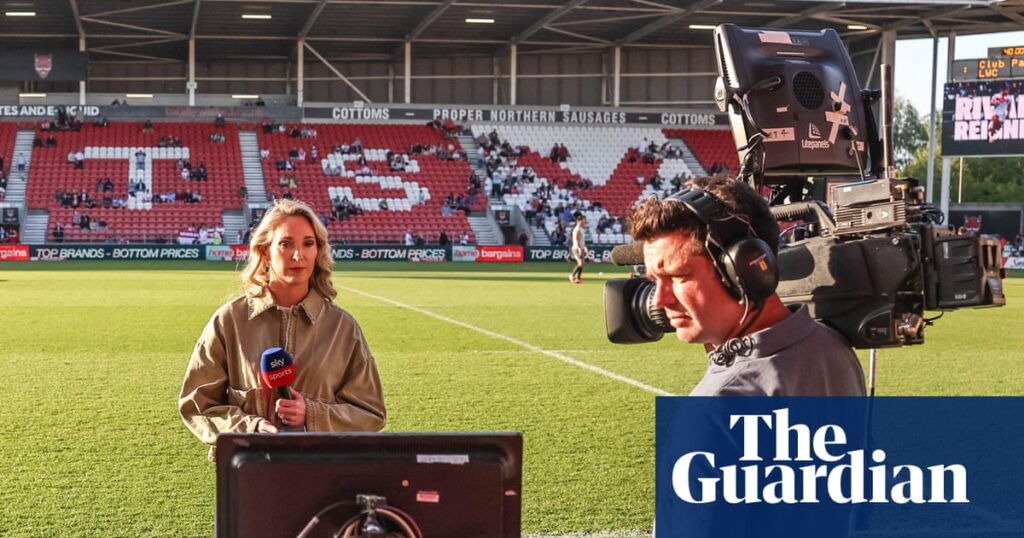Super League’s long-term partnership with Sky Sports that bankrolls the sport could be jeopardised by plans to expand the competition to 14 teams next season.
The existing 12 Super League clubs voted in favour of expansion earlier this week following the recommendations of a strategic review led by the Rugby Football League chair, Nigel Wood, but the Guardian has learned that the plan has yet to be endorsed by their broadcast partner.
Under the terms of the current deal, Sky broadcasts every Super League game live, but it is understood that the cost of televising an extra game across 27 rounds next year would be around £500,000. The Guardian has been told Sky is reluctant to pick up the additional cost for matches it did not buy in a tender process that concluded almost two years ago, and has no intention of increasing its rights fees to support two extra clubs.
Sky’s three-year deal to provide exclusive live coverage of Super League enters its final 12 months next season, and while there is no suggestion of the broadcaster terminating that contract, senior sources have indicated that the expansion could affect negotiations over future deals. RL Commercial officials are understood to have been locked in discussions with Sky since the vote on Monday about what expansion means for the existing contract, and have yet to receive the reassurances they are looking for.
Sky has been Super League’s broadcast partner since the competition launched in 1996 and around 170 games will be shown live this season, but the value of the contract has dropped significantly in recent years. Officials who were present at the meeting at Headingley that approved expansion have privately admitted that one of their big concerns was how the broadcaster would react to the decision, as well as how the extra games will be financed.
Super League clubs are receiving a total of £21.5m from Sky this year compared to £40m in 2021. The comparison with other sports is also alarming, with their £21.5m rights fee less than Sky pays to televise just three Premier League games, while the broadcaster is investing around £20m a year in the Women’s Super League from next season in rights fees and production costs.
Sky’s declining financial backing for rugby league is a major concern for the sport as it prepares to enter the final year of its TV deal, particularly given the limited interest from elsewhere and how reliant rugby league is on its income from the Sky Sports contract. TNT Sports made a speculative offer for the current rights, but it has since spent £200m on a new five-year deal for Premiership Rugby so may not bid again. IMG, the sports marketing agency that manages the grading process which determines Super League membership, are currently leading a tender process for the next broadcast cycle beginning in 2027.
Sky declined to comment, but one source at the broadcaster said that rugby league was fighting for its future. In another complication, Sky also broadcasts Australia’s National Rugby League, which has held talks about buying a 33% stake in Super League but made clear it sees it as a 10-team competition. Sources in Australia have indicated expansion to 14 teams effectively kills any hope of direct investment into Super League in the near future.
With no additional TV money forthcoming following expansion, the Super League clubs have also yet to decide how the extra two teams will be funded next season. A number of clubs are understood to have argued strongly that they will not accept a cut in their own central payments from the Sky deal. Some Championship clubs vying for promotion as part of expansion plans have indicated they would be willing to enter the competition with no central distribution for one season in 2026.
Such a move would expose newly promoted clubs to potential financial risk, as well as raise further concerns about the Super League’s competitiveness. Financially-troubled Salford were thrashed 82-0 by St Helens at the start of the season, and have conceded 50 points on two more occasions.
after newsletter promotion
As reported by The Guardian, Hull FC and Hull KR voted against expansion in a meeting at Headingley on Monday, while Wigan abstained amid confusion over the criteria to be used by the RFL panel who will select the two extra teams for next season’s competition.


